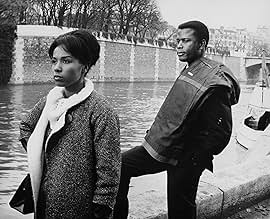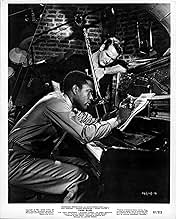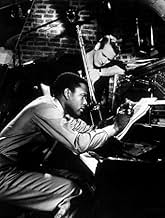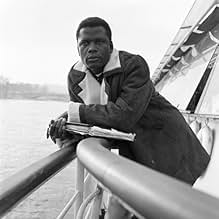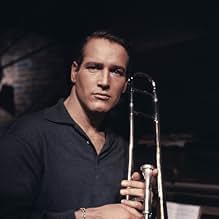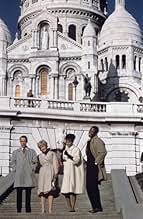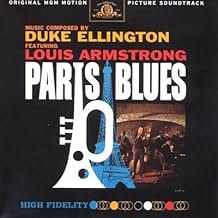IMDb-BEWERTUNG
6,7/10
4281
IHRE BEWERTUNG
Während der 1960er-Jahre verlieben sich zwei amerikanische Jazzmusiker, die in Paris leben, in zwei amerikanische Touristinnen.Während der 1960er-Jahre verlieben sich zwei amerikanische Jazzmusiker, die in Paris leben, in zwei amerikanische Touristinnen.Während der 1960er-Jahre verlieben sich zwei amerikanische Jazzmusiker, die in Paris leben, in zwei amerikanische Touristinnen.
- Für 1 Oscar nominiert
- 2 Nominierungen insgesamt
Guy Pedersen
- Bass Player
- (as Guy Pederson)
Emilien Antille
- Alto Sax Player with Armstrong at Club 33
- (Nicht genannt)
Roger Blin
- Guitarist Fausto the Moor
- (Nicht genannt)
Charles Bouillaud
- Luggage Carrier in Train
- (Nicht genannt)
Michel Dacquin
- Guest at Devigne's Party
- (Nicht genannt)
Hélène Dieudonné
- The Pusher
- (Nicht genannt)
Michel Garland
- Club 33 Customer
- (Nicht genannt)
Empfohlene Bewertungen
When the story begins, Ram (Paul Newman) and Eddie (Sidney Poitier) are American musicians who have been living in Paris for some time. They love jazz and spend their evenings performing in various clubs. However, their bohemian lifestyle is about to be challenged in the form of two ladies who are traveling together (Joanne Woodward and Diahann Carroll). When love is in the air, there are problems--can such a lifestyle work with wives AND would these men be willing to return home to the States if need be?
This is a film I really enjoyed for a couple reasons. First, the acting was terrific and the characterizations were very nice. Second, the story is unusual. However, some of it being unusual is because the movie leaves the viewer wondering what will happen next...will they have a happy ending or not? Well, the film doesn't make this clear...which didn't bother me. Worth seeing.
This is a film I really enjoyed for a couple reasons. First, the acting was terrific and the characterizations were very nice. Second, the story is unusual. However, some of it being unusual is because the movie leaves the viewer wondering what will happen next...will they have a happy ending or not? Well, the film doesn't make this clear...which didn't bother me. Worth seeing.
Paris Blues (1961)
*** (out of 4)
American Jazz musicians Ram (Paul Newman) and Eddie (Sidney Poitier) are living in Paris where they spend all night practicing their music. Americans Lillian (Joanne Woodward) and Connie (Diahann Carroll) find themselves in Paris on vacation and soon they meet the musicians and sparks fly. The two week vacation soon has Lillian having major feelings for Ram but he knows if he decides to go with her it would mean going away from his love of music.
Paris BLUES comes from director Martin Ritt who made a number of films with Newman but this one here has to be the most underrated. I really don't understand why this film isn't better known because it features a terrific cast and has some outstanding music as well as being a lot more sexual and mature than a lot of films made during this period.
The main reason to watch this are for the performances and especially the chemistry of Newman and Woodward. The couple was already married by the time they made this and that chemistry between them just jumps right off the screen and especially the sexual tension between the two. Newman is very good in his rather grumpy role and he nails that part perfectly but he also nails the romantic side. Poitier is basically playing second fiddle here but it's still a lot of fun seeing him and Newman work together. Carroll is excellent in her supporting role and it was a lot of fun seeing Louis Armstrong.
The Jazz music score is perfect and I thought the film did a terrific job at playing up the Paris nightlife and the life of two musicians who are up all night. I thought the four stars had an excellent chemistry together and it makes for their journey to be quite entertaining. It also doesn't hurt that the film also deals with race relations without beating the viewing over the head. Paris BLUES really deserves to be seen by more people as it's certainly a nice little gem.
*** (out of 4)
American Jazz musicians Ram (Paul Newman) and Eddie (Sidney Poitier) are living in Paris where they spend all night practicing their music. Americans Lillian (Joanne Woodward) and Connie (Diahann Carroll) find themselves in Paris on vacation and soon they meet the musicians and sparks fly. The two week vacation soon has Lillian having major feelings for Ram but he knows if he decides to go with her it would mean going away from his love of music.
Paris BLUES comes from director Martin Ritt who made a number of films with Newman but this one here has to be the most underrated. I really don't understand why this film isn't better known because it features a terrific cast and has some outstanding music as well as being a lot more sexual and mature than a lot of films made during this period.
The main reason to watch this are for the performances and especially the chemistry of Newman and Woodward. The couple was already married by the time they made this and that chemistry between them just jumps right off the screen and especially the sexual tension between the two. Newman is very good in his rather grumpy role and he nails that part perfectly but he also nails the romantic side. Poitier is basically playing second fiddle here but it's still a lot of fun seeing him and Newman work together. Carroll is excellent in her supporting role and it was a lot of fun seeing Louis Armstrong.
The Jazz music score is perfect and I thought the film did a terrific job at playing up the Paris nightlife and the life of two musicians who are up all night. I thought the four stars had an excellent chemistry together and it makes for their journey to be quite entertaining. It also doesn't hurt that the film also deals with race relations without beating the viewing over the head. Paris BLUES really deserves to be seen by more people as it's certainly a nice little gem.
this movie has been mischaracterized as a fluffy love story, it is not. this film examines racial equality and the differences between France and the us in accepting people of color as more than "help" or as something to fear. this film also touches on the popularity of jazz music, and showcases authentic early jazz as well as painting a picture of the hip jazz subculture, including smoky clubs, late nights and loose women. the film also shows the journey of young musicians trying to find their style and find a place for themselves as jazz composers- not just as musicians. finally, this movie does reflect aspects of a love story- but in examining the film on a deeper level one finds that there really is no love, rather it is a commentary on disconnected, self-indulgent lust. finally - Louis Armstrong appeared and played in the movie- Does it get any better?
Within 2 years of "Paris Blues" being released the US involvement in Vietnam began to sour the relationship between America and la rive gauche. French intellectuals affected to disdain the United States and all its works;one of the few aspects of Americana that were permitted to be still admired was jazz music. Even so the myth of the American jazz musician as a god-like figure had faded by the mid sixties.Giants like Louis Armstrong and Duke Ellington were still revered but the journeymen jazzers like Ram Bowen(Newman)no longer filled the clubs just because they were American. The Indian Summer of America's honeymoon with Europe peaked with "Paris Blues".
Beautifully shot in black and white in the quintessentially Parisian parts of the city where the 2 pairs of lovers could stroll hand in hand photogenically it was a love letter to the arondissements beloved of Scott Fitzgerald,Hemingway and Gertrude Stein 30 years after the affair had ended.
Paul Newman was never more charming,Sidney Poitier never more cool and self-effacing;their pairing considered quite daring at the time coming just a few years after the ground-breaking "The Defiant Ones". Duke Ellington wrote the score and his "Mood Indigo" is beautifully played by Murray McCeachern.Louis Armstrong plays himself - why his character is named Wild Man Moore one can only speculate.
I saw "Paris Blues" when I was 20 years old and my love affair with jazz was a its height. Looking at it now it doesn't seem all that special,the characters and situations have all become clichés;but perhaps that's a bit like saying "Hamlet"'s a good play but it's full of quotations.
Beautifully shot in black and white in the quintessentially Parisian parts of the city where the 2 pairs of lovers could stroll hand in hand photogenically it was a love letter to the arondissements beloved of Scott Fitzgerald,Hemingway and Gertrude Stein 30 years after the affair had ended.
Paul Newman was never more charming,Sidney Poitier never more cool and self-effacing;their pairing considered quite daring at the time coming just a few years after the ground-breaking "The Defiant Ones". Duke Ellington wrote the score and his "Mood Indigo" is beautifully played by Murray McCeachern.Louis Armstrong plays himself - why his character is named Wild Man Moore one can only speculate.
I saw "Paris Blues" when I was 20 years old and my love affair with jazz was a its height. Looking at it now it doesn't seem all that special,the characters and situations have all become clichés;but perhaps that's a bit like saying "Hamlet"'s a good play but it's full of quotations.
10rps-2
For starters, this is one of those rare movies that would not have been as good if it had been shot in colour. B&W somehow fits the mood, the story and the setting. Yet it's not really a sad or dark story. As in many older B&W films, the lighting is magnificent with highlights and shadows and textures that simply aren't workable in colour. The performances are universally superb. The script is free of the usual clichés. And the music is great. (How could you possibly make a bad movie with the likes of Louis Armstrong, Paul Newman, Joanne Woodward, Sidney Poitier and Diane Carrol?) Nor, in that era (1961), did Hollywood zoom in and linger obsessively on sexual acrobatics. This is a mature, sexy film without any graphic sex. Those were the rules back then and this film is the better for them. A thoroughly enjoyable movie with a great cast that has stood the test of a half century very well indeed.
Wusstest du schon
- WissenswertesPaul Newman was coached in playing the trombone by Billy Byers, while the playing for Newman on the soundtrack was done by Murray McEachern. Sidney Poitier's tenor sax playing was done by Paul Gonsalves. The soundtrack was recorded May 1-3, 1961 at Reeves Sound Studios in New York City.
- PatzerSome may believe that the mouthpiece ligature on the tenor saxophone that Eddie Cook (Sidney Poitier) plays is upside down. However, in the first scene when the band is playing, it can be seen that the thumbscrew that adjusts the ligature is on the bottom, where it normally would be. It is, therefore, not upside down.
- Crazy Credits"Introducing" Serge Reggiani, who by 1961 had been in French films for 20 years and a star at least throughout the 1950s.
- VerbindungenFeatured in A Century of Black Cinema (2003)
- SoundtracksTake The 'A' Train
(uncredited)
Music by Billy Strayhorn
Recorded at Reeves Sound Studios, New York on May 2 & 3, 1961.
Label - United Artists
Top-Auswahl
Melde dich zum Bewerten an und greife auf die Watchlist für personalisierte Empfehlungen zu.
- How long is Paris Blues?Powered by Alexa
Details
Box Office
- Bruttoertrag in den USA und Kanada
- 1.300.000 $
- Laufzeit1 Stunde 38 Minuten
- Farbe
- Seitenverhältnis
- 1:66
Zu dieser Seite beitragen
Bearbeitung vorschlagen oder fehlenden Inhalt hinzufügen



